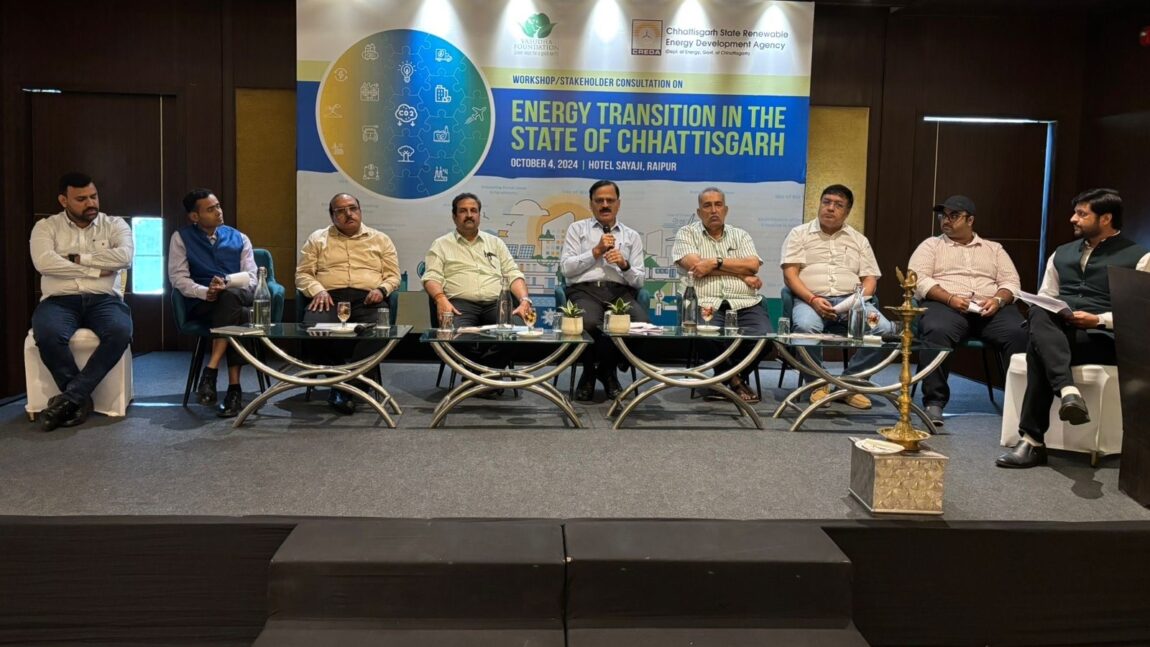October 4, 2024 | Hotel Sayaji, Raipur
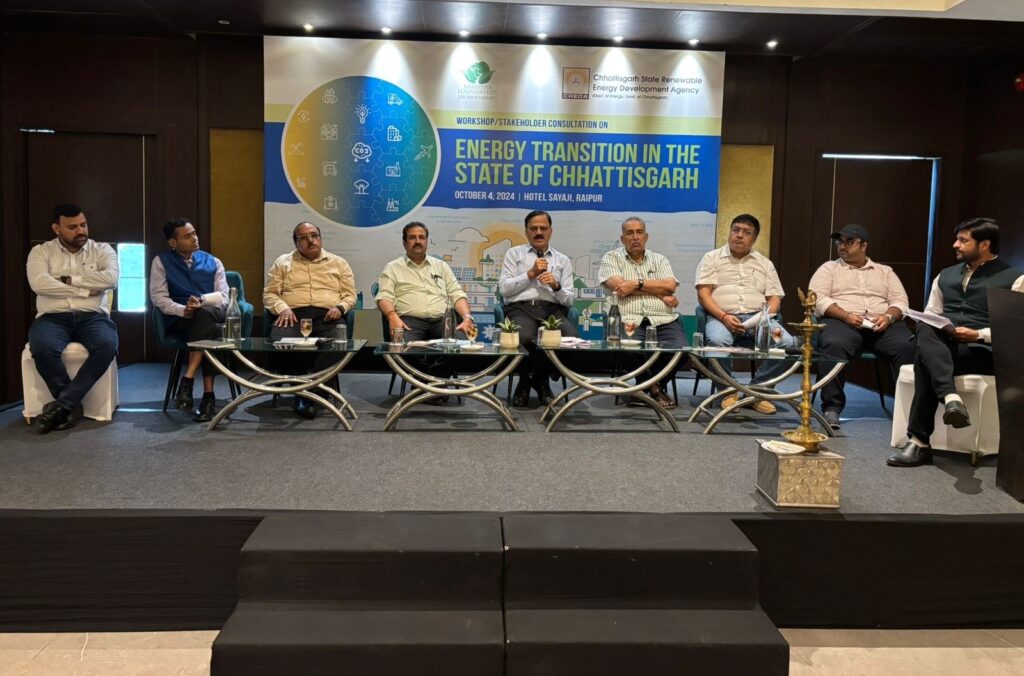
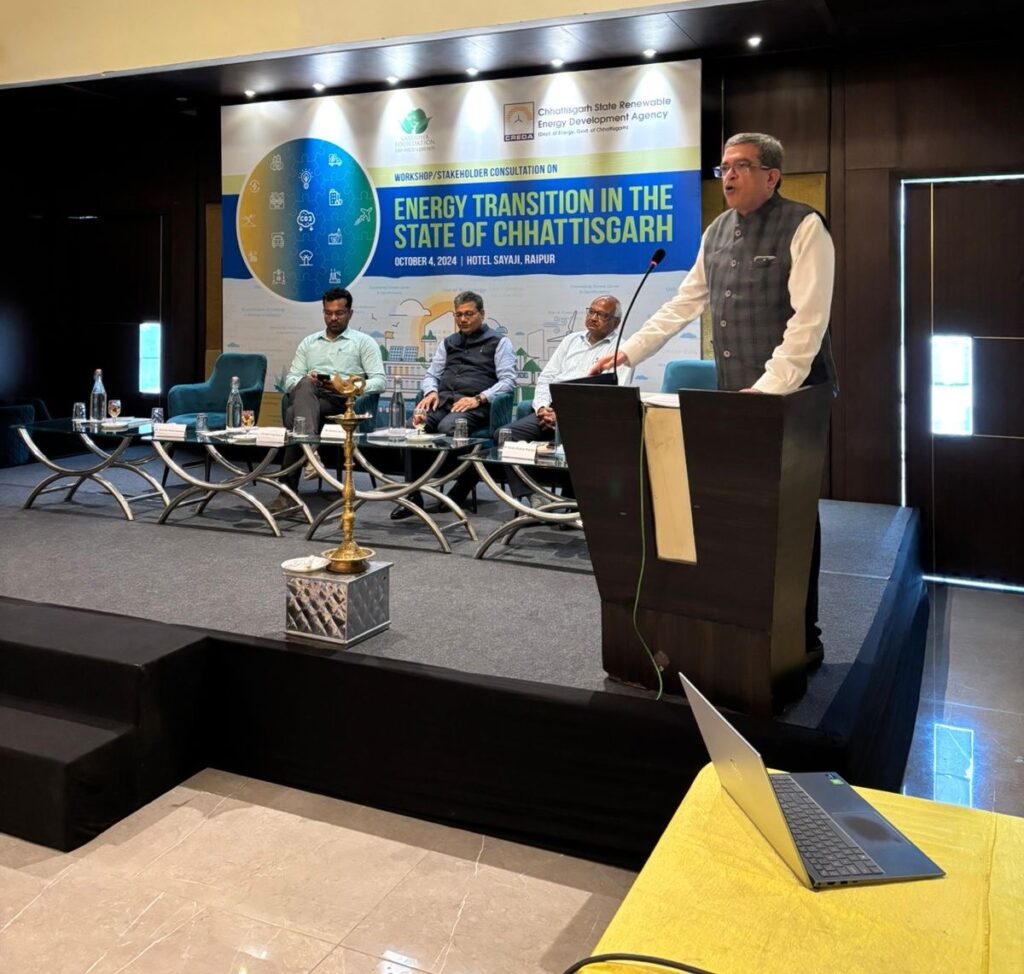
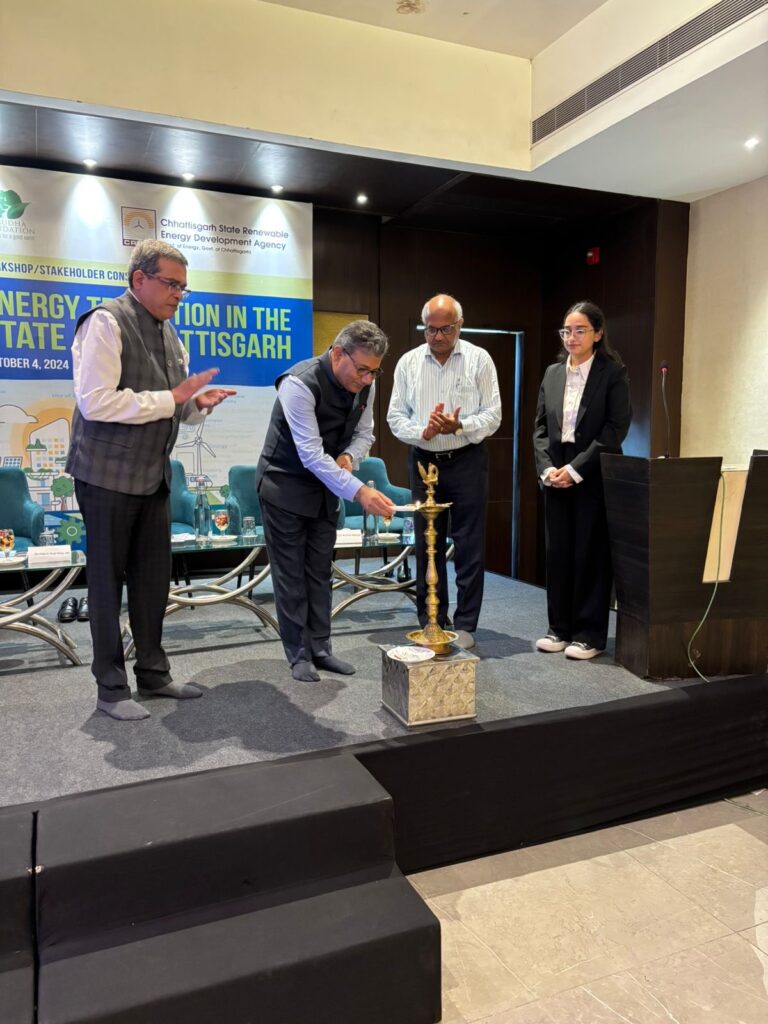
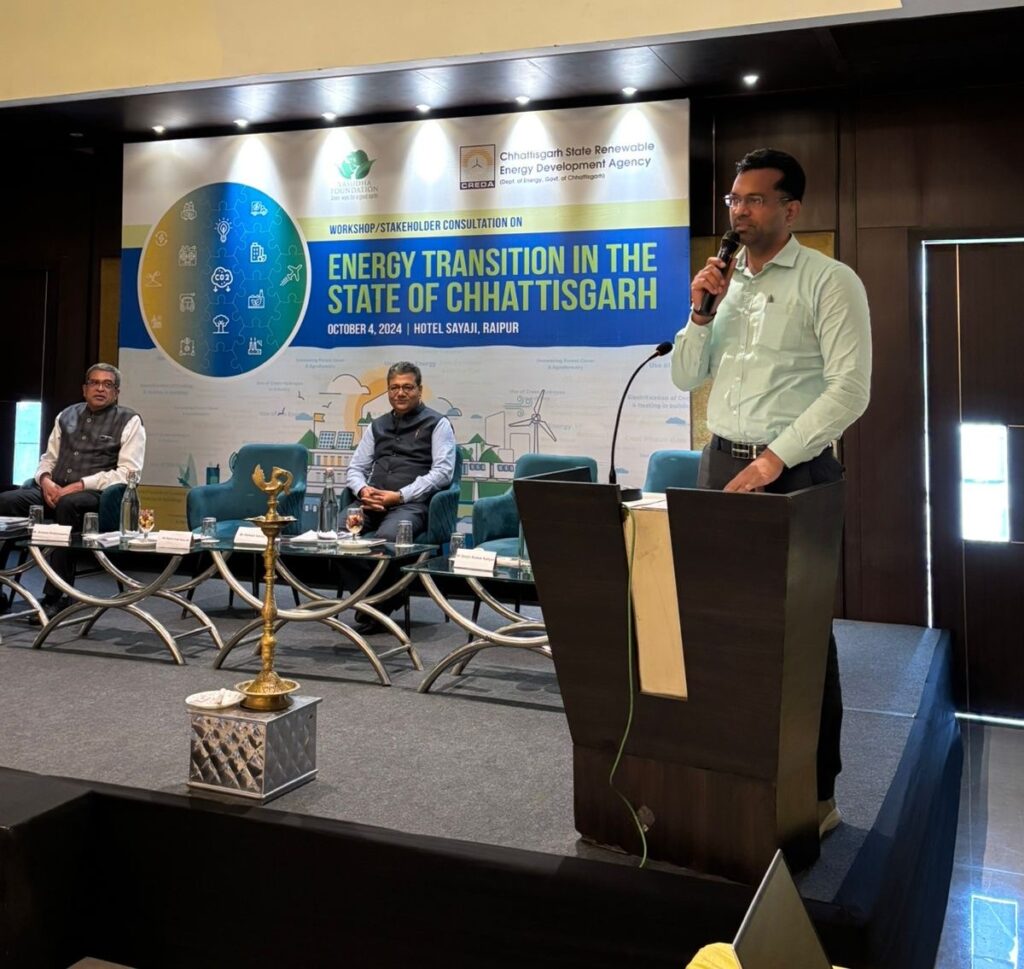
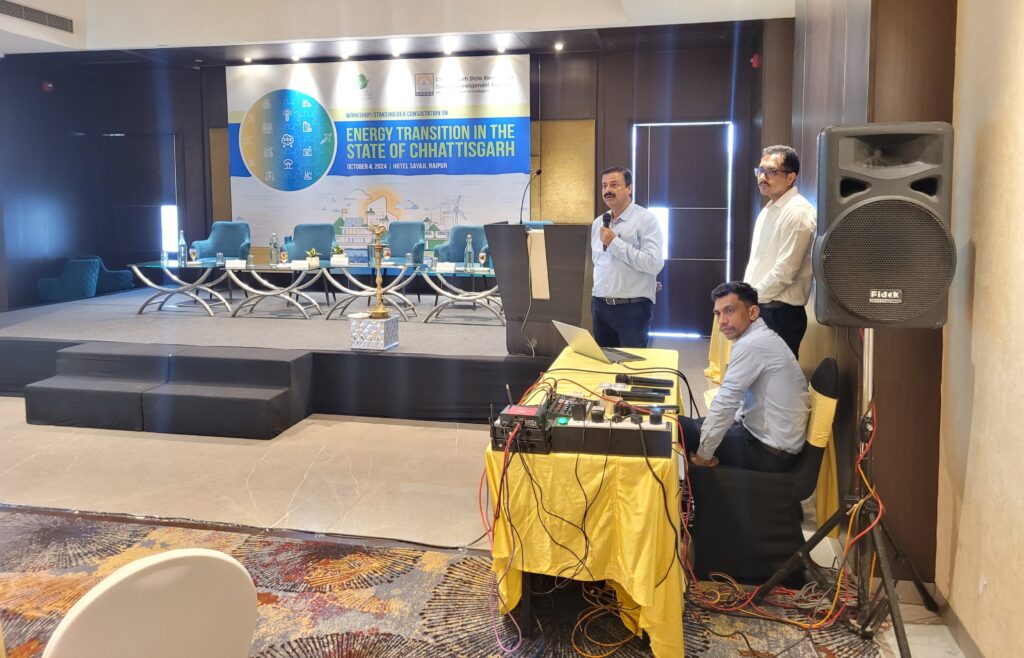
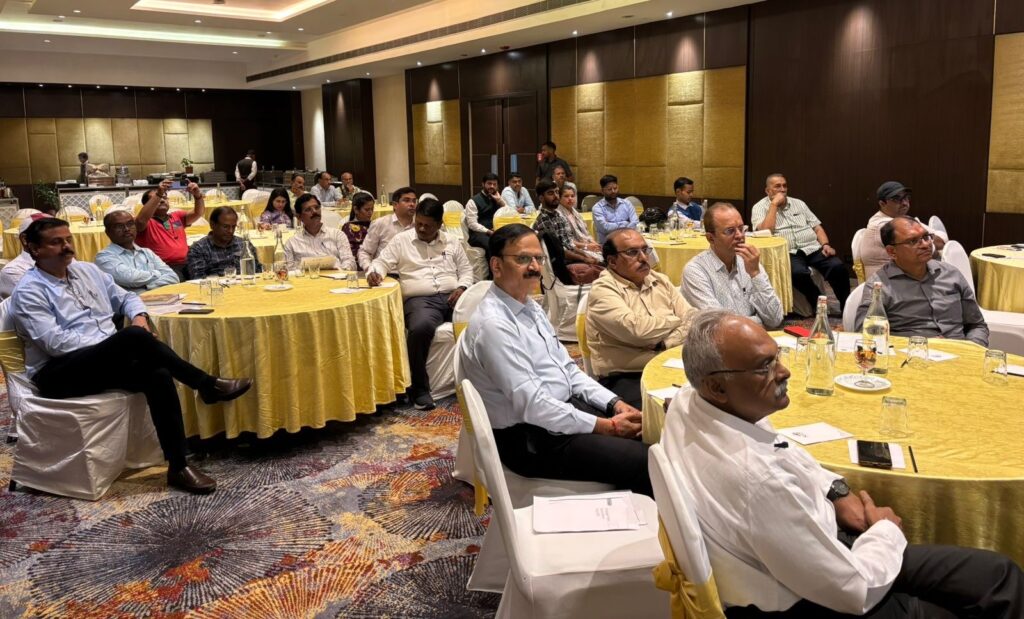
Vasudha Foundation, in collaboration with the Chhattisgarh Renewable Energy Development Agency (CREDA), organised a ‘Stakeholder Consultation on Energy Transition in the state of Chhattisgarh,’ on October 4, 2024.
During the inaugural address, Mr Srinivas Krishnaswamy put forth the context of the event by mentioning that the state is at the crossroads of decarbonisation and economic growth. He further mentioned the need for collaboration amongst stakeholders and the data streamlining through digital platforms can steadfast energy transition in the state.
Shri Rajesh Singh Rana, IAS, CEO of Chhattisgarh State Renewable Energy Development Agency (CREDA), delivered a keynote address highlighting the state’s progress in renewable energy (RE) integration and outlining the investment-friendly framework that encourages private sector participation in Chhattisgarh’s green energy transition.
Shri Hemant Verma, Chairperson of the Chhattisgarh State Electricity Regulatory Commission (CSERC), emphasised the critical role of energy storage technologies and demand-side management in navigating the state’s energy transition successfully. He further highlighted the role of advanced technologies including green hydrogen and smart grids to enable faster energy transition in the state.
Shri Sanjiv Kumar Katiyar, Managing Director of Chhattisgarh State Power Generation Company Limited (CSPGCL), underlined the rapid growth of renewable energy uptake and stressed the importance of pumped storage solutions to maintain grid stability in the state. He further emphasised that rationalising solar policies in the state has fastened the growth of RE capacity addition in the state.
A panel discussion titled ‘Navigating the Energy Transition: Challenges and Opportunities for Chhattisgarh’ was moderated by Mr Raghav Pachouri, Associate Director, Vasudha Foundation.
Esteemed Panellists:
Mr Sanjay Sharma, Chairman, Interdepartmental Lead Agency, Joint Transport Commissioner (Road Safety), Transport Department
Mr Sanjay Shukla, Chief Engineer (Commercial & Regulatory Affairs), CSPGCL
Mr P.V. Sajeev, Additional Chief Engineer, CSPDCL
Mr Ramesh Singh Bhakuni, Superintending Engineer (SE), CREDA
Dr Debashis Sanyal, Dean (FW), NIT Raipur
Dr Sanjib Banerjee, Associate Professor, Dept. of Chemistry, IIT Bhilai
Mr Nikhil Mall, Senior Manager, Vasudha Foundation
Mr Abdul Waris, Executive Engineer, Public Works Department, Raipur
Key Takeaways from the Panel Discussion
- Stakeholder Engagement and Collaboration:
- Collaborative Efforts: Chhattisgarh’s energy transition hinges on collaboration between government bodies, private developers, and civil society organisations. A key point raised was the need for enhanced partnerships across sectors, including academia, policymakers, and investors, to facilitate smoother execution of renewable energy projects.
- Private Sector Involvement: The regulatory environment and incentives offered by the state, including exemptions on transmission charges and innovative schemes, have created an attractive platform for private sector investments in solar and energy storage projects. The speakers called for sustained collaboration between CREDA, CSPDCL, and private developers to further accelerate project execution.
- Land Availability: The state has witnessed an exponential rise in solar capacity, spurred by targeted policies and regulatory support. However, land availability remains a significant challenge for large-scale solar installations, especially due to forest conservation laws. Panellists suggested exploring barren lands and leveraging floating solar projects on water bodies.
2. Renewable Energy Integration:
- Energy Storage: Energy storage systems (ESS) were highlighted as pivotal for balancing grid loads, especially during peak demand times when solar energy may not be available. Firm and dispatchable renewable energy (FDRE) projects, which combine renewable generation with storage solutions, were identified as crucial for grid stability.
- Pumped Storage Projects: The role of pumped storage projects was discussed as a long-term solution for managing energy demands during periods of peak consumption. Successful projects in Chhattisgarh—such as the 40 MW solar energy storage plant developed by SECI—were cited as examples that could be scaled up.
- Cost and Investment: While energy storage systems are expensive, they are critical for ensuring round-the-clock energy availability. The panel emphasised the need for further investments in battery storage technologies and financial incentives to encourage more developers to take up these projects.
3. Electric Vehicles and Public Transportation:
- EV Transition: The state is advancing towards electric mobility with the introduction of 240 new electric buses in the state and a pilot project for electric tractors. The need for developing EV infrastructure—such as charging stations—and ensuring that renewable energy is the primary source for powering these EVs was emphasised.
- Public Transport: Panellists stressed on the need for public transport and developing the supporting infrastructure.
4. Policy and Regulatory Support:
- Regulatory Bodies’ Role: CSERC and CREDA are actively supporting Chhattisgarh’s renewable energy transition by facilitating regulatory frameworks and policies that encourage renewable energy integration. Policies like net metering, energy banking, and transmission charge waivers have helped increase private sector participation.
- Need for Clear Guidelines: The panel underscored the importance of transparent policy guidelines to ensure that all stakeholders—private developers, investors, and public authorities—are aligned in their goals.
5. Energy Conservation and Urban Development:
- Energy conservation was highlighted as a key pillar for sustainable urban development. Panellists emphasised the role of smart energy management systems and behavioural change in reducing unnecessary energy use, particularly in urban centers. The integration of non-motorised transport systems and public transit networks was discussed as a strategy to lower the state’s overall carbon footprint.
6. Skill Development and Capacity Building:
- Capacity Building Initiatives: Institutions like IIT Bhilai and NIT Raipur are playing a critical role in developing skills amongst professionals that can contribute to Chhattisgarh’s energy transition. Collaboration with MSMEs and startups in the renewable energy sector was emphasised as a means to foster innovation and create local employment.




